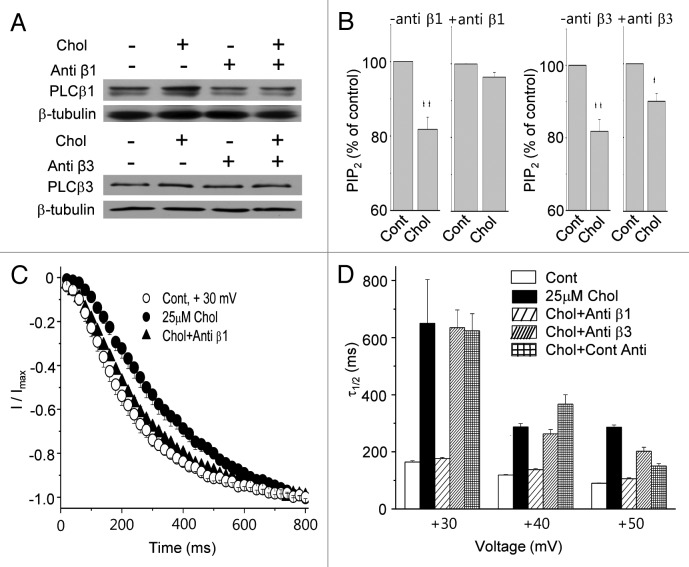Figure 9. Suppression of PLCβ1 expression prevents the effects of the mild membrane cholesterol enrichment on HERG channel. (A) The effect of the mild membrane cholesterol enrichment on PLCβ1 and PLCβ1 expression was blocked in the presence of antisense oligonucleotides directed against PLCβ1 and PLCβ3, respectively. Cells were incubated with or without 25 μM MβCD -soluble cholesterol for 1 h, and the expression levels of PLCβ1 and PLCβ3 were tested using western blotting. Before cholesterol enrichment, some cells were pre-treated with 10 μM antisense oligonucleotides for 2 h directed against PLCβ1 (anti β1) or PLCβ3 (anti β3). Similar results were obtained from four different experiments. Antisense oligonucleotides having no specific target were used for controls in all of experiments. (B) Anti β1 prevented the effect of cholesterol on PtdIns(4,5)P2 levels. Cells were incubated with anti β1 or anti β3 for 2 h and then incubated with or without 25 μM MβCD-cholesterol for the additional 1 h. PtdIns(4,5)P2 levels in the membrane were measured by using PtdIns(4,5)P2 ELISA kit. The effect of cholesterol on PtdIns(4,5)P2 levels was blocked in the presence of anti β1 (n = 5). However, anti β3 was not able to block the effect of cholesterol (n = 5). *p < 0.05; **p < 0.01 (C) The time course of HERG channel activation was analyzed from cells incubated with 25 μM MβCD-cholesterol for 1 h in the presence or in the absence of Anti β1 as described in Figure 5B. (D) The half times to maximal rise (τ1/2) were obtained by fitting the curves from the time course of HERG channel activation at different testing voltages.

An official website of the United States government
Here's how you know
Official websites use .gov
A
.gov website belongs to an official
government organization in the United States.
Secure .gov websites use HTTPS
A lock (
) or https:// means you've safely
connected to the .gov website. Share sensitive
information only on official, secure websites.
